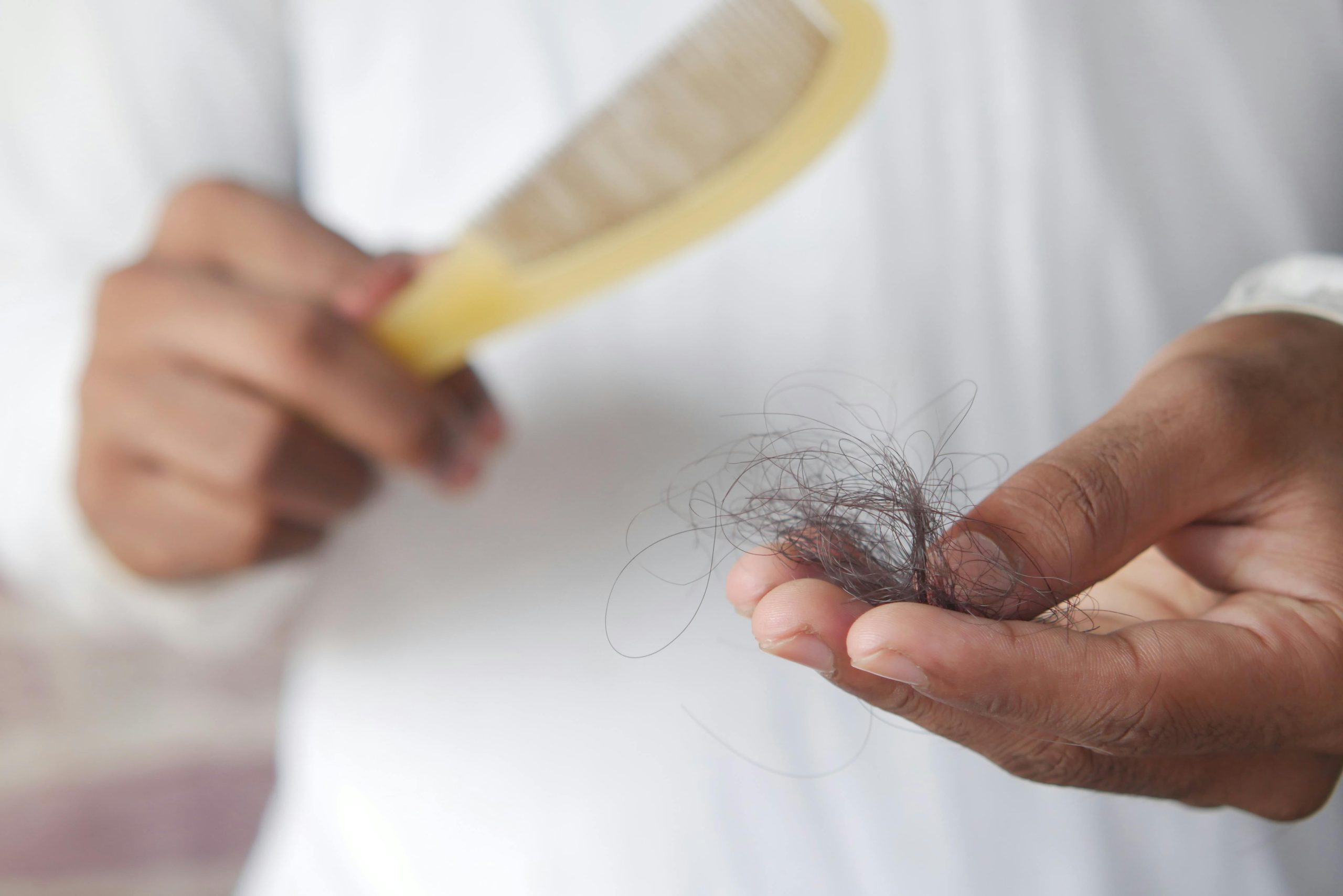Tirzepatide (brand names Mounjaro and Zepbound) has become a breakthrough treatment for weight loss and diabetes management.
But as users see results on the scale, many are asking the same question: does tirzepatide cause hair loss?
Let’s look at what science actually says, what’s normal, and what you can do to protect your hair while losing weight safely.
SEE HOW TIRZEPATIDE CAN HELP YOU
Quick Answer: Does Tirzepatide Cause Hair Loss
Tirzepatide itself doesn’t directly cause hair loss.
However, rapid weight loss, nutritional changes, and hormonal shifts that happen while using tirzepatide can lead to temporary shedding (telogen effluvium), a reversible form of hair loss.
Understanding Tirzepatide and Weight Loss
Tirzepatide is a dual GIP and GLP-1 receptor agonist, meaning it mimics two natural hormones that regulate blood sugar and appetite.
This dual action helps people feel full sooner and eat less, often leading to significant weight reduction, with studies showing 15–22% of total body weight.
While these results are impressive, your body interprets such fast changes as stress.
This stress can temporarily affect hair growth cycles.
How the Hair Growth Cycle Works
Hair grows in repeating stages:
- Anagen (growth phase): lasts years and makes up 85–90% of your hair.
- Catagen (transition phase): short, lasting a few weeks.
- Telogen (resting/shedding phase): old hairs fall out before new ones grow.
When you lose weight quickly or experience a sudden metabolic shift, more hairs can move into the telogen phase, leading to diffuse shedding.
This is called telogen effluvium, and it’s often temporary.
What Research Says: Tirzepatide and Hair Loss
In clinical trials for Zepbound, about 4–5% of users reported hair loss, compared to 1% on placebo.
The loss was mild and resolved over time.
Researchers attributed it to nutrient shifts and metabolic stress, not to the medication damaging hair follicles.
Why Hair Loss Happens During Weight Loss
Several factors come together during tirzepatide use that can affect hair growth:
- Nutrient Deficiency: Reduced calorie intake can lower levels of protein, iron, zinc, vitamin D, and biotin, all critical for hair health.
- Hormonal Changes: GLP-1 medications influence insulin, thyroid hormones, and cortisol — all of which affect follicle activity.
- Calorie Restriction and Stress: When your body senses stress or undernourishment, it prioritizes vital organs over hair growth.
- Inflammation and Gut Changes: GLP-1 agonists also change how nutrients are absorbed in the gut, which can indirectly affect hair health.
Tirzepatide vs. Semaglutide: Which Causes More Hair Loss?
Hair loss rates appear similar between tirzepatide (Zepbound/Mounjaro) and semaglutide (Wegovy/Ozempic).
In both, reported hair shedding ranges between 3–5% of users.
The difference isn’t due to the medication, it’s related to how quickly someone loses weight and their nutritional status during that process.
SEE WHICH OPTION IS RIGHT FOR YOU
When Does Hair Loss Start and When Does It Stop?
Most users notice shedding two to four months after starting tirzepatide, right when weight loss peaks.
This delay happens because hair follicles take several months to respond to internal changes.
The good news, in the vast majority of cases, hair regrowth begins within 3–6 months once the body adapts.
Who’s More at Risk for Hair Loss on Tirzepatide?
You may be more likely to experience temporary shedding if you:
- Lose weight rapidly (over 2 lbs per week)
- Eat too few calories or too little protein
- Have low iron, zinc, or vitamin D
- Have thyroid issues, PCOS, or hormonal imbalances
- Have a history of postpartum or stress-related hair loss
Identifying these risk factors early can prevent more noticeable shedding.
What to Do If You Notice Hair Loss on Tirzepatide
Here’s what you should do if you start to notice hair loss during your tirzepatide treatment:
- Check Your Nutrition: Prioritize protein (0.8–1g per pound of lean body mass) and foods rich in iron, zinc, and vitamins B, D, and E. Nutrient testing can help find deficiencies early.
- Slow Down Weight Loss: A steady loss of 1–2 lbs per week reduces the stress on your hair cycle.
- Manage Stress and Sleep: Sleep 7–8 hours a night and use mindfulness or relaxation techniques to lower cortisol levels.
- Support Hair Growth Topically: Consider minoxidil (Rogaine), PRP therapy, or low-level laser therapy to support regrowth.
- Test for Hormonal Imbalances: If shedding lasts beyond six months, check ferritin, thyroid, and vitamin levels or consult an integrative provider.
Nutritional and Integrative Support at Optimize Integrative Health
At Optimize Integrative Health, we take a comprehensive approach to preventing and reversing hair shedding while on tirzepatide.
Our team offers:
- Lab testing for nutrient deficiencies, thyroid function, and hormone balance
- Custom nutrition and supplement plans for optimal hair health
- Peptide therapy to stimulate regrowth
- Integrative coaching to support safe, sustainable weight loss
If you’re noticing changes in your hair while using tirzepatide, we can help identify the root cause and develop a personalized plan for recovery.
Hair Regrowth: What to Expect
Telogen effluvium is almost always temporary.
As long as you address nutritional and hormonal factors, your hair will regrow.
The regrowth phase typically begins after your weight stabilizes, though full density may take several months.
Hair Loss Timeline with Tirzepatide
| Stage | Timeframe | What Happens | What to Expect |
| 1. Adjustment | 0–2 months | Body begins losing weight | No noticeable shedding |
| 2. Shedding Phase | 2–4 months | Hair enters telogen phase | Mild to moderate shedding |
| 3. Stabilization | 4–6 months | Weight loss slows | Shedding decreases |
| 4. Regrowth | 6–9 months | Follicles recover | New growth visible |
Key Takeaways
- Tirzepatide doesn’t directly cause hair loss, but rapid weight loss and nutrient shifts can lead to temporary shedding.
- Hair loss occurs in about 4–5% of users and is usually reversible.
- Focus on nutrition, stress reduction, and gradual weight loss to prevent it.
- Most people see regrowth within 3–6 months after stabilization.
- Work with a provider to rule out thyroid or nutrient imbalances if shedding persists.
Conclusion: Does Tirzepatide Cause Hair Loss
Hair loss while taking tirzepatide can feel discouraging, but it’s almost always temporary and related to the body’s rapid adjustment to weight loss, not the medication itself.
By focusing on nutrition, steady progress, and integrative support, you can restore balance and regrow stronger, healthier hair.
If you’re struggling with hair shedding or other side effects during your weight loss journey, Optimize Integrative Health can help.
Our team specializes in personalized care that supports both your appearance and overall wellness.
FAQs: Does Tirzepatide Cause Hair Loss
Will my hair grow back after tirzepatide?
Yes. Most people experience temporary shedding due to rapid weight loss or nutrient changes, not permanent damage. Once your body stabilizes and nutrition is optimized, hair typically regrows within three to six months.
How to stop hair loss while on Mounjaro?
Focus on a balanced diet rich in protein, iron, zinc, vitamin D, and B vitamins. Avoid losing weight too quickly, manage stress, and consider treatments like minoxidil or PRP therapy. Working with an integrative provider can help identify nutrient deficiencies or hormonal imbalances that contribute to shedding.
What are the side effects of taking tirzepatide?
Common side effects include nausea, vomiting, diarrhea, constipation, and decreased appetite. Some users may experience fatigue, dizziness, or mild hair shedding from rapid weight loss. These effects are usually temporary and improve as your body adjusts to the medication.
Will hair loss from weight loss grow back?
Yes. Hair loss caused by rapid weight loss, known as telogen effluvium, is reversible. Once your calorie intake and nutrient levels stabilize, hair follicles re-enter the growth phase and new strands begin to grow within a few months.
What vitamin am I lacking if my hair is falling out?
Hair loss is often linked to deficiencies in iron, zinc, vitamin D, and B-complex vitamins such as biotin and B12. A comprehensive blood panel can help determine which nutrients you may need to restore healthy hair growth.
What are the benefits of tirzepatide?
Tirzepatide offers multiple benefits, including significant weight loss, improved blood sugar control, reduced insulin resistance, and better cardiovascular health. It can also lower inflammation and support overall metabolic balance, making it one of the most effective options for long-term weight management.
How does tirzepatide work for weight loss?
Tirzepatide mimics two natural hormones, GLP-1 and GIP, which regulate blood sugar and appetite. This dual action slows digestion, reduces cravings, and promotes feelings of fullness, helping you eat less and lose weight sustainably.
What is the best peptide for weight loss?
While tirzepatide is one of the most effective medical peptides for weight management, others like semaglutide, CJC-1295, and Ipamorelin also support fat loss and metabolism. The best option depends on your health goals, hormone balance, and metabolism, which can be evaluated through an integrative consultation.




